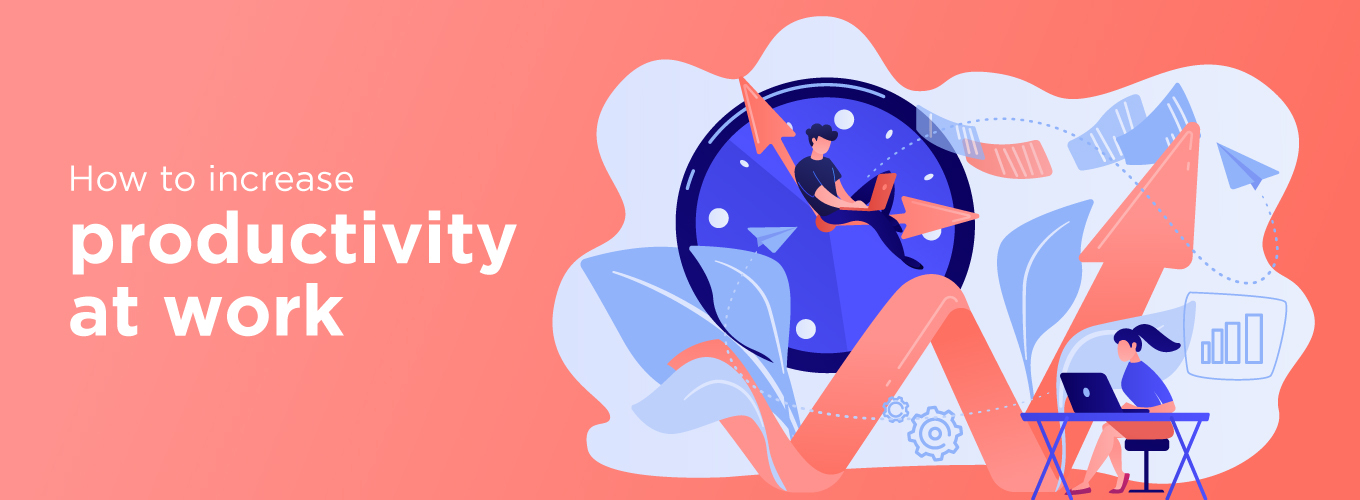How to Increase Productivity at Work
There is no better way to increase productivity at work than to learn to value time. If you realize how precious your time is and how to manage it, no matter what role you are playing in the organization, you will learn to work smarter. And working smarter is the key to productivity.
Here are some ways in which you can learn to work smarter.
1.Value time
It is a myth that you have all day to do everything that you set out to do in a day. In most organizations work days have defined timings so that you can do your tasks in a set period and have a fresh start for the next day. However, because we are often distracted during the day, or we are unplanned about what to accomplish, or both, we fritter away our working hours. And we either sit up late to finish tasks or we carry them forward. In the first instance, we are ruining precious family time. And in the latter we are making the rest of our week, month or quarter messy.
The only way out of all this is to value your time. Do what you set out to do in a calm and focused manner.
2.Understand how you work
Another common culprit that impacts productivity is not knowing yourself and the way you work. If you use an app like Rescue Time or keep a traditional log of your daily activities, recording how much time you invest in each of them, you will get an idea of where you time is getting invested and/or lost. Record how much time you spend on email, on messaging apps, on phone calls, on social media and on serious creative project work or discussions. Analyze data for your workflow, for your key results areas/what you have accomplished versus the time you invested. The findings will hold up a mirror to you. Acting on those findings can make you more effective and efficient.
3.Set self-imposed deadlines and don’t breach them.
If something is due on a given date, set yourself a deadline that is ahead of the due date and time. And don’t breach your deadline. Make this a rigorous practice. That is the only way you can avoid stressing out over a deadline and provide for exigencies that may crop up from time to time.
4.Don’t bite off more than you can chew
As the ancient adage goes, “Don’t bite off more than you can chew”. In a work and productivity context, don’t load your plate with too much stuff. Work has to be enjoyed. When you keep piling up stuff onto your plate, you are actually setting yourself up for more stress. This means you will have less quality time for yourself and/or for your family. And that will further add to your stress levels. So, set a limit for how many tasks or projects you can handle in a day and week. Stick to allowing only that many on your plate.
5.Learn to say a polite “no”
When people around you, like a boss or a friendly colleague, want to add something on to your plate, and if your plate is already full, learn to politely refuse them. Say “no”. Period. And most certainly say no to attending meetings when you have important deadlines coming up or when you know for sure that you can’t add any value to that meeting. Meetings are a huge drain on people’s time. And most meetings are managed inefficiently and are not really productive.
6.When on a deadline, stay focused
Do not multitask on days when you are working on serious stuff that has a deadline impact. It could be a project report or a concept note or a presentation. If it requires your undivided attention, then give it undivided attention. Be focused. What takes away your attention from such important work are often trivial tasks. So, avoid multitasking on such days. Switch off all distracting influences and focus on what you need to get done. You will surprise yourself with the quality and quantity of your output on such days. The challenge that you can set up for yourself then is, if you can be so productive one day of the week, why not achieve this feat every day of the week?
These are the scientific studies on productivity from Venture Harbour
- 40% of knowledge workers never get more than 30 minutes of uninterrupted focused time in a workday.
- 17% of people can’t even get 15 minutes of uninterrupted focused time without communication.
- Only 30% receive an hour of dedicated focused time per day.
7.Use travel and commute time efficiently
When you are on a plane, get some work done. Avoid driving or riding to work. Use public transport. Use these times to get some administrative tasks and emails out of the way. Or, if you can plan better, you can use this time to pause and reflect on your tasks, projects, goals and deadlines.
8.Don’t work after office hours and on weekends
There is a reason why most countries and corporations follow a five-day week. The two days that you have extra in a week are for you to focus on yourself and your family. Carrying work home and working incessantly is not a very sensible thing to do. You must repair and rejuvenate yourself. You must be available to your family so that you have a wholesome life. So, plan well and shut down each day and weekly. And even if you see emails and messages come in, choose not to respond.
9.Keep your workspace clutter-free
A clean workspace is critical to boost productivity. Organize your workspace the way you would organize your calendar or your schedules. What you are working on must be the only file or folder that must be open. Turn off notifications on your devices when you work. Without doubt, too many open windows and pop-up notifications can clutter your workspace and your screen.
In conclusion
Importantly, stop blaming others or the environment that you work and live in for your productivity woes. There are ways to use the power of productivity to get more done and do your best work without putting too much pressure on yourself. You have to be more efficient if you are not getting more done in your eight-hour days or 40-hour weeks.
Ready to start your job hunt? Check out the Xpheno Job Board today!









